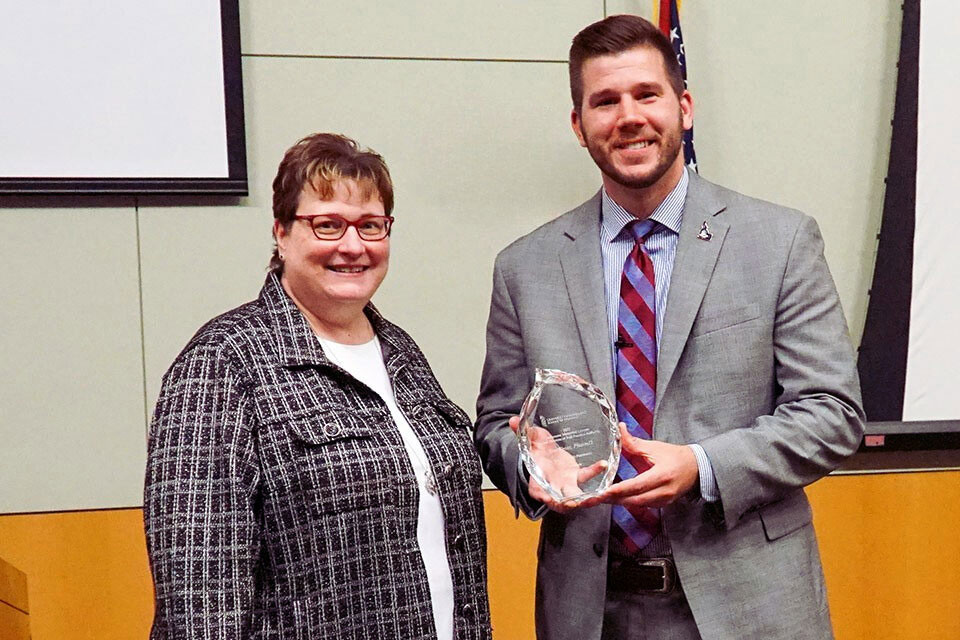SOP Gets to the Heart of Pharmacogenomics During Annual Balassone Lecture
Dr. Larisa Cavallari explains how using cardiology patients’ genetic information to guide dosing for certain medications can help improve patient care.
By Malissa Carroll
October 30, 2014
“It’s an exciting time for pharmacogenomics,” exclaimed Larisa Cavallari, PharmD, BCPS, FCCP, who delivered the annual Francis S. Balassone Memorial Lecture at the University of Maryland School of Pharmacy on Oct. 6. Titled “Cardiovascular Pharmacogenomics: Applications to Patient Care,” Cavallari’s lecture highlighted how pharmacogenomics, which examines how a patient’s genotype (genetics) affects his or her response to medications, could be implemented in clinical settings to help improve care for cardiology patients.
As a former associate professor of pharmacy practice at the University of Illinois at Chicago (UIC), Cavallari – who currently serves as an associate professor in the Department of Pharmacotherapy and Translational Research and director of the Center for Pharmacogenomics at the University of Florida College of Pharmacy – directed efforts at the University of Illinois Hospital and Health Sciences System to implement genotype-guided dosing for all patients newly starting warfarin during hospitalization.
“Each patient newly starting warfarin submitted a genetic sample for testing,” said Cavallari. “When the results of the test were available, a pharmacist and physician would provide a joint consult, which included a warfarin dose recommendation for the patient. The pharmacist followed the patient each day he or she was hospitalized, refining the dose as needed.”
Prescribed for patients who recently suffered a blood clot, or those with certain types of irregular heartbeat or prosthetic heart valves, warfarin is used to prevent clots from forming in blood vessels. However, certain genetic variants can put individuals at an increased risk for bleeding when prescribed the drug’s standard dose.
“In cardiology, there is a demand for evidence from randomized, controlled clinical trials,” said Cavallari. “However, most clinical trials evaluate outcomes based on how a drug performs in the overall population. Pharmacogenomics is not concerned with the overall population. Most people will have a normal genotype. It is only individuals with certain genetic variants who might be at risk for toxicity or who will not have a good response to the drug.”
Cavallari presented the results of two recent clinical trials that aimed to assess the benefits and harms associated with genotype-guided dosing for patients on warfarin. While one trial found that patients dosed according to their genotype experienced better outcomes, such as time in the therapeutic range with warfarin, than patients dosed based on conventional measures, the other trial showed that genotype-guided dosing was no better than clinically-guided dosing in the overall population, and worse for African Americans.
The results of the second trial — the Clarification of Optimal Anticoagulation Genetics (COAG) trial — concerned Cavallari and her colleagues. “We were using genotype-guided dosing. Were we hurting our patients?” she questioned.
Though Cavallari found a number of differences between UIC’s warfarin service and the COAG trial, she wanted to be sure that the hospital’s efforts to provide the most accurate warfarin dose recommendations were not harming patients. She and her colleagues compared outcomes from more than 300 patients who received genotype-guided dosing for warfarin with outcomes from patients who were prescribed warfarin before genotype-guided dosing was implemented at the hospital.
The results of this study will be presented at the American Heart Association Scientific Sessions in November 2014 in Chicago, but Cavallari hinted that the outcomes are promising, especially for African Americans. However, she notes that more research is needed, particularly to compare differences in outcomes between patients who receive genotype-guided dosing and those who are dosed based on clinical factors, including age, weight, and race.
Concluding her lecture, Cavallari spoke about her work with the Personalized Medicine Program at the University of Florida College of Pharmacy to implement genotype-guided dosing for clopidogrel, a blood thinner used to help prevent heart attacks, strokes, and other cardiovascular problems, as well as her participation in the Implementing Genomics in Practice (IGNITE) program at the National Institutes of Health (NIH).
“The NIH is a tremendous supporter of implementing pharmacogenomics in clinical practice,” said Cavallari. “Through the IGNITE program, we strive to support new methods for incorporating patients’ genetic information into clinical care and explore ways to effectively implement, diffuse, and sustain genomic medicine in clinical practice.”



